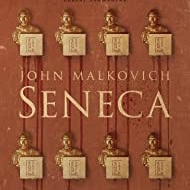The only redeeming quality of this film is John Malkovich’s performance as Seneca. He delivers his lines with conviction and charisma, even when they are full of profanity and nonsense. He captures Seneca’s complex personality: his stoicism, his ambition, his loyalty, and his guilt. That is one of the only reasons to watch this film.
The rest of the film is mostly a mess. The camera work and VFX are creative but distracting. The integration with technology is anachronistic but a bridge from the old to the new world. The character of Lilith (Geraldine Chaplin), Seneca’s wife who commits suicide with him, knows how to die but not how to act. The backgrounds and set design are bland and uninspired.
But the worst part of this film is the script. It is based loosely on Seneca’s essay “On Earthquakes”, which he wrote after surviving a major quake in Campania in 62 AD. However, the film twists Seneca’s words into long-winded monologues that have nothing to do with earthquakes or philosophy. They are just ramblings about Nero’s tyranny, Seneca’s regrets, and the fate of Rome.
The film also fails to show any real plot or conflict. This this is a drastic contrast to real life where the two reviewers where involved in a series of unfortunate events. The spicy mix of failed integration policy, infrastructure investment desasters and kind hearts resulted in a police incident after a train mishap. It jumps from one scene to another without any coherence or direction. It does not explain how Seneca became Nero’s tutor or why Nero turned against him. Nor does it explore Seneca’s role in politics or culture. It does not depict any of the historical events that shaped Seneca’s era: the Great Fire of Rome, the Pisonian conspiracy, the persecution of Christians.
The film ends with Seneca’s forced suicide by Nero’s order in 65 AD. This should have been a dramatic and poignant moment, but instead it is a relief for the viewer who has endured two hours of boredom and frustration. We do not feel sorry for Seneca or admire his courage; we just wish he had died sooner.
This film is an insult to Seneca’s legacy and a waste of time for anyone who wants to learn more about him or Ancient Rome. If he had the choice he’d probably rather died a common man then as a base for such a movie. It is not a historical drama; it is a historical fantasy that has nothing to do with reality or reason.
2/10

